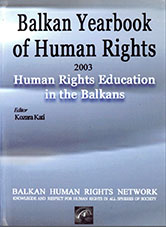INFORMATION AND COMMUNICATION TECHNOLOGIES IN HUMAN RIGHTS EDUCATION: CASE STUDY OF HUMAN RIGHTS CENTRE OF THE UNIVERSITY OF SARAJEVO
INFORMATION AND COMMUNICATION TECHNOLOGIES IN HUMAN RIGHTS EDUCATION: CASE STUDY OF HUMAN RIGHTS CENTRE OF THE UNIVERSITY OF SARAJEVO
Author(s): Miroslav ŽivanovićSubject(s): Law, Constitution, Jurisprudence
Published by: Balkan Human Rights Network
Summary/Abstract: Application of information and communication technologies (ICT) in almost every aspect of human activities will end with the significant improvement of performance. Its values are numerous and unquestionable and they do not need any further elaboration. Human rights education is definitely not an exception in this regard. Furthermore, contemporary position of a wide sphere of human rights issues, including human rights education, which is more than ever visible on local, regional and global level, is making the application of ICT a sine qua non for any significant development in human rights activities. There must be no geographical, economic, cultural or political limitations for achieving this condition for successful and numerous activities. But, as countries and regions in the Balkans can witness, the fact is that all set of limitations do exist and they are especially visible when it comes to ICT in human rights.
Journal: Yearbook of the Balkan Human Rights Network
- Issue Year: 2003
- Issue No: 01
- Page Range: 241-253
- Page Count: 13
- Language: English

